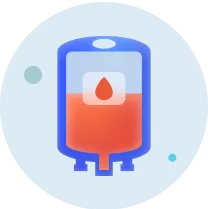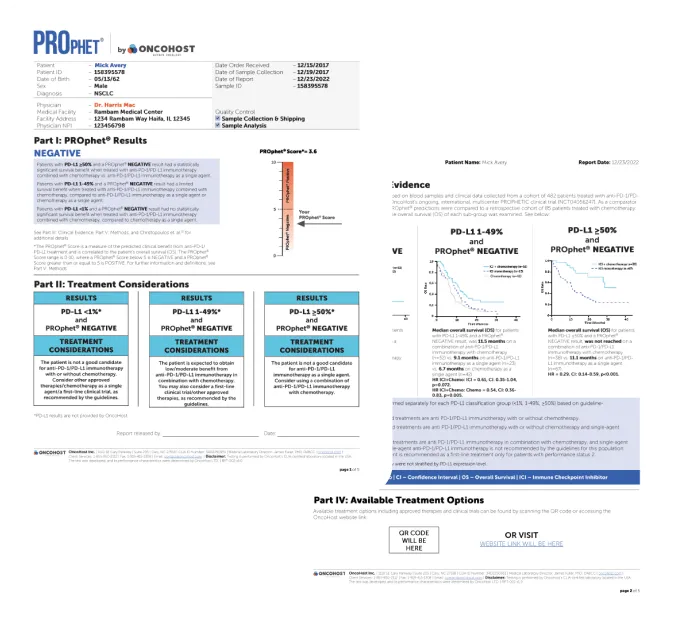


PROphet® test requisition form (TRF) filled out and sent to OncoHost


OncoHost delivers kit to you or your clinic and schedules blood draw


Phlebotomist performs blood draw and overnights it to the OncoHost lab


Your plasma is processed and analyzed at OncoHost's CLIA lab

Physician receives your PROphet® report
PROphet® is a first-of-its-kind platform that employs high-throughput proteomic profiling (protein analysis) technology to assess patient response to treatment, enabling oncologists to provide truly personalized care. Its first test indication is for advanced non-small cell lung cancer (NSCLC).
Analyzing just one pre-treatment blood sample, PROphetNSCLC™ scans proteins in your blood to identify patterns that decode the cancer resistance mechanisms in your body. These patterns are predictive of your likeliness to obtain clinical benefit from PD-1/PD-L1 inhibitor treatments.
Utilizing bioinformatics and machine learning technology, PROphet® produces a personalized report answering an important clinical question:

A measure of your predicted clinical benefit from PD-1/PD-L1 inhibitors. The score will be POSTIVE or NEGATIVE.
The treatment options your doctor may consider based on your PROphet® score and
PD-L1 result combined.


The scientific research that is the foundation of the PROphet® test.
Including approved therapies and clinical trials (NEGATIVE reports only.)
Precision oncology is about tailoring cancer treatment to each person's unique characteristics. This involves finding reliable biomarkers in the body that can give information about how well a person might respond to a specific treatment.
Most precision oncology tools currently focus on changes inside the cancer cells, like genetic mutations and alterations in how genes are activated.
But a growing body of evidence suggests that cancer and its treatment can cause various changes in the patient's body, the "host," and not just in the tumor itself.
These changes involve complex interactions between the tumor, the patient, and the treatment, which can sometimes support the growth and spread of the cancer, making it resistant to the treatment intended to eradicate it.

Test ordered and results completed

Insurance claim filed by OncoHost for patient

Patient may receive Explanation of Benefits from insurance company (this is not bill)

Claim is adjudicated

OncoHost sends final invoice to patient with Financial Assistance Program application
Financial assistance is available for qualifying patients who have out-of-pocket costs associated with OncoHost’s PROphet® test.*
Financial assistance is based on need and can be applied for at any time before, during or after testing. Payment plans may also be available based on your financial situation.
For any additional information or questions about our billing process, insurance, or Medicare coverage, please reach out to our Client Services team via email at contact@oncohost.com or by phone at 1-855-950-2112.
In effect until December 31, 2024
*OncoHost’s Financial Assistance Program is only available to patients whose tests were ordered within the United States and U.S. territories.
What is proteomic profiling? Why do we use this type of test?


Proteomics is the large-scale profiling of proteins and their levels, a powerful tool in the fight against cancer. Your blood contains thousands of proteins in various levels. These proteins are derived from different cells in the body, including tumor and immune cells, and, as such, can serve as a depiction of your health condition.
PROphet® employs SomaScan® technology that scans approximately 7,000 proteins in your blood plasma, identifying proteomic patterns unique to you that serve as indicators of the cancer resistance mechanisms predictive of your treatment response. The proteins that are scanned include cytokines, chemokines, growth factors and enzymes associated with therapy resistance and tumor spread.
The result of this proteomic analysis provides your physician with precise, personalized clinical insights, allowing them to administer a treatment plan tailored to you.
How does proteomic testing differ from next-generation sequencing (NGS)?


Proteomic profiling focuses on the proteins in your blood, identifying biomarkers that can indicate the occurrence of biological processes taking place in the tumor and within the body that potentially affect the success of treatment.
Next-generation sequencing (NGS) is performed to obtain important information regarding the genomic and genetic make-up of your tumor. Some genetic alterations are known as “driver mutations” or “biomarkers,” which provide important information that will help guide your overall treatment plan.
Proteomic analysis used alongside NGS testing can provide your doctor with valuable insights into your tumor growth, the characteristics of your tumor, and what may impact your response to therapy.
What will my doctor learn from the PROphet® report?


Your personalized PROphet® report will provide a prediction of clinical benefit from PD-1/PD-L1 inhibitor therapies. The personalized report will show either a POSITIVE or NEGATIVE PROphet® result, providing your physician with additional information to consider in your treatment plan.
What if my report shows that I have a NEGATIVE PROphet® result? Does this mean I won’t respond to any treatment?


This does not mean you will not respond to any treatment plan. Rather, it will provide your doctor with valuable information while planning your treatment. The report provides additional insights to your first-line treatment plan, based on your personalized proteomic analysis.
The alternative treatment options suggested in the report are all either FDA-approved treatments or those currently in late-stage clinical trial development.
What if my report shows that I have a POSITIVE PROphet® result? Does this mean I will respond to treatment?


This means that you have a high likelihood of achieving clinical benefit on an approved PD-1/PD-L1 inhibitor treatment regimen.
When will my results be ready?


Once your blood is drawn and sent to our lab, we will process your specimen and prepare the report. The total turnaround time is 7-14 business days. Your doctor will receive a copy of the report once complete and be in touch with you to review the results and discuss next steps.


PROphet® is a plasma-based proteomic pattern recognition system that predicts patient outcomes and assists in clinical drug development. It analyzes 7,000 proteins using aptamer-based assays and combines data collection with AI/ML models for patient selection, OS (overall survival)/PFS (profession-free survival) prediction, MoA (Mechanisms of Action) discovery, AE (adverse events) prediction, and response prediction. It is applicable in oncology, autoimmune diseases, inflammation, and inflammatory bowel disease.


PROphet® is a plasma-based proteomic pattern recognition system that predicts patient outcomes and assists in clinical drug development. It analyzes 7,000 proteins using aptamer-based assays and combines data collection with AI/ML models for patient selection, OS (overall survival)/PFS (profession-free survival) prediction, MoA (Mechanisms of Action) discovery, AE (adverse events) prediction, and response prediction. It is applicable in oncology, autoimmune diseases, inflammation, and inflammatory bowel disease.


PROphet® is a plasma-based proteomic pattern recognition system that predicts patient outcomes and assists in clinical drug development. It analyzes 7,000 proteins using aptamer-based assays and combines data collection with AI/ML models for patient selection, OS (overall survival)/PFS (profession-free survival) prediction, MoA (Mechanisms of Action) discovery, AE (adverse events) prediction, and response prediction. It is applicable in oncology, autoimmune diseases, inflammation, and inflammatory bowel disease.


PROphet® is a plasma-based proteomic pattern recognition system that predicts patient outcomes and assists in clinical drug development. It analyzes 7,000 proteins using aptamer-based assays and combines data collection with AI/ML models for patient selection, OS (overall survival)/PFS (profession-free survival) prediction, MoA (Mechanisms of Action) discovery, AE (adverse events) prediction, and response prediction. It is applicable in oncology, autoimmune diseases, inflammation, and inflammatory bowel disease.


PROphet® is a plasma-based proteomic pattern recognition system that predicts patient outcomes and assists in clinical drug development. It analyzes 7,000 proteins using aptamer-based assays and combines data collection with AI/ML models for patient selection, OS (overall survival)/PFS (profession-free survival) prediction, MoA (Mechanisms of Action) discovery, AE (adverse events) prediction, and response prediction. It is applicable in oncology, autoimmune diseases, inflammation, and inflammatory bowel disease.


PROphet® is a plasma-based proteomic pattern recognition system that predicts patient outcomes and assists in clinical drug development. It analyzes 7,000 proteins using aptamer-based assays and combines data collection with AI/ML models for patient selection, OS (overall survival)/PFS (profession-free survival) prediction, MoA (Mechanisms of Action) discovery, AE (adverse events) prediction, and response prediction. It is applicable in oncology, autoimmune diseases, inflammation, and inflammatory bowel disease.